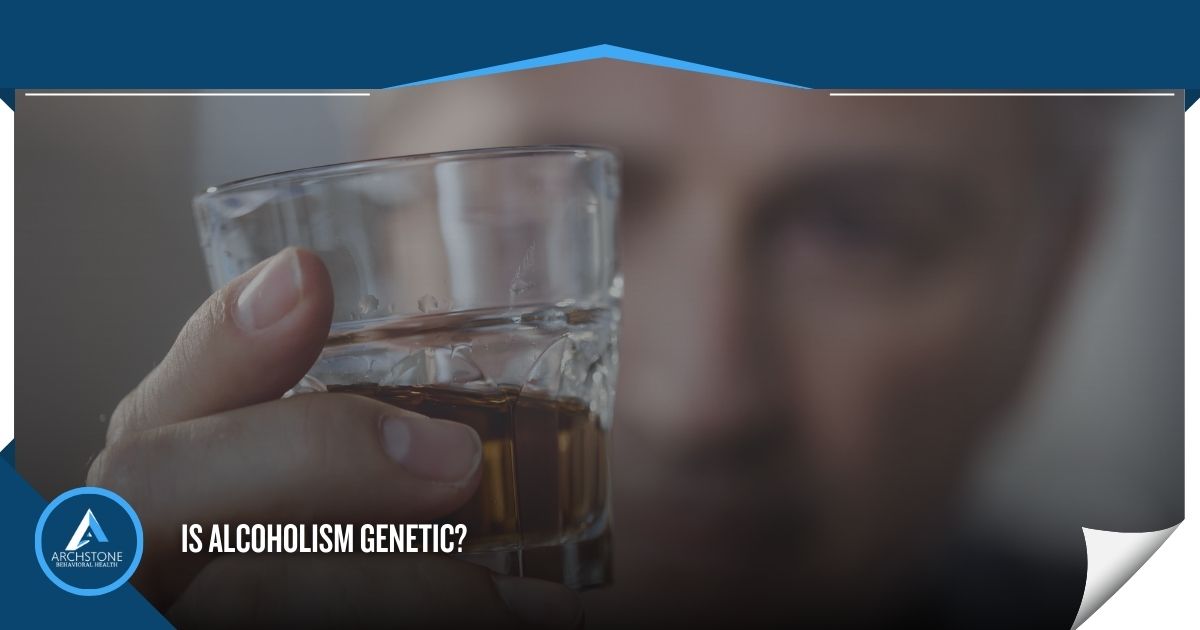Is Alcoholism Genetic?
Get Help Now
Alcohol abuse and addiction can impact a person’s life in many ways.
Many people wonder how addiction develops. Understanding what factors contribute to substance abuse and addiction may help people get the treatment they need.
Parents pass down genes to their children. A parent’s genes can affect a child’s eye color, personality traits, and other factors. Researchers have also found that there is a genetic aspect of alcoholism and different types of addiction.
This article will explore the connection between genetics and alcoholism. You will learn about other risk factors for alcohol addiction and how to identify the need for help.
Contact the Archstone Behavioral Health team now to learn about our alcohol addiction treatment programs.
Is Alcoholism Genetic?
Alcoholism (now called alcohol use disorder (AUD)) is a condition that involves excessive alcohol misuse. People with AUD continue to drink even when alcohol causes serious, even life-threatening consequences.
Research has found that alcohol use disorder does have a genetic component. The National Institute on Alcohol Abuse and Alcoholism (NIAAA) conducts research on alcohol addiction. They found a person’s genetic makeup accounts for about 50% of the risk of alcoholism.
Other factors contribute to substance use disorder (SUD) and alcoholism. A genetic predisposition may increase your susceptibility to alcohol abuse. However, people without a family history of AUD can still develop this condition.
Some people wonder if there is a single gene that increases the risk of developing AUD. However, there is no evidence to suggest there is an “alcohol gene” responsible for AUD. However, researchers have identified several genetic factors that may increase a person’s risk of alcohol abuse or addiction.
Some addiction experts believe that simply living with an addicted parent may increase the risk of developing SUD or AUD. This and other environmental factors may play an essential role in your risk for alcohol addiction.
What Other Factors Contribute to Alcoholism?
In addition to the role genes play, other factors can increase the risk of developing AUD. Here is an overview of some of the most significant factors that may lead to alcoholism.
Mental health conditions
Living with a mental health condition can make life more stressful and challenging. Research shows it can also increase the risk of developing alcoholism.
Some of the mental health conditions associated with higher rates of AUD include:
- Depression
- Schizophrenia
- Personality disorders
- Bipolar disorder
- Anxiety
People who have AUD and a mental illness require comprehensive dual diagnosis treatment to recover from both conditions.
Environment
In addition to a genetic risk, your environment can affect your chances of developing alcoholism. Living with a parent with alcohol use disorder may increase your risk of AUD. Growing up in a family or community that normalizes alcohol abuse can also raise your risk of alcoholism.
Early adverse life experiences
Children who experience neglect, abuse, or other trauma may grow up with a greater risk of developing AUD. Traumatic experiences can leave a lasting mark on children. As they grow up, they may turn to drugs or alcohol to cope with the emotional pain.
It is important to understand the factors that increase the risk of alcoholism. If you or someone you love struggles with alcohol abuse, trauma, or other types of addiction, you must seek comprehensive treatment.
Do I Need Treatment for Alcoholism?
In the United States, alcohol use is common. Most adults in the US report drinking from time to time. Alcohol is available in many social settings, and drinking is widely accepted.
Because alcohol use is so common, it can be challenging to determine if someone is struggling with alcohol abuse. Many people live with unhealthy patterns of drinking. Some may drink heavily for a long time before seeking treatment.
Long periods of heavy drinking can lead to alcoholism. Alcoholism is a physical dependence on alcohol. People with alcoholism do not choose to drink. They must drink to avoid going into withdrawal and becoming very sick.
Some signs of alcoholism include:
- Drinking alone
- Lying about your drinking
- Hiding or covering up your drinking
- Losing interest in your hobbies, relationships, and work because of your drinking
- Feeling guilty about your drinking
- Drinking as soon as you wake up in the morning
- Prioritizing drinking over everything else
- Having frequent, extreme mood swings
- Experiencing cravings for alcohol
- Frequently drinking more than you planned to
- Losing the ability to control how much or when you drink
People with alcohol addiction experience withdrawal symptoms if they stop drinking. Withdrawal symptoms may include:
- Excessive sweating
- Tremors
- Nausea
- Headache
- Anxiety
- Insomnia
Some people experience dangerous symptoms during withdrawal, including:
- Dangerously high body temperature
- Extreme confusion
- Hallucinations
- Seizures
Find Alcoholism Treatment Now
If you live with alcoholism, it is crucial to seek medically-supported detox treatment as you begin recovery. Contact the Archstone Behavioral Health specialists to learn about our comprehensive treatment programs or schedule an intake appointment.
